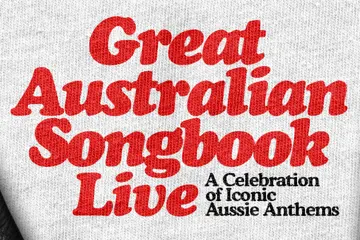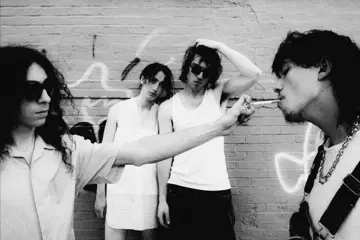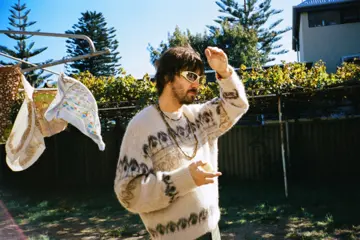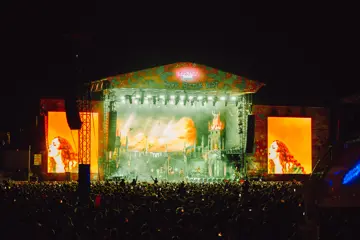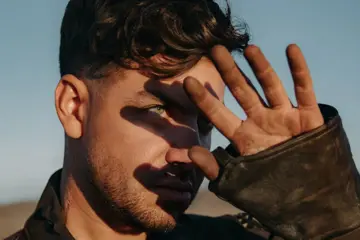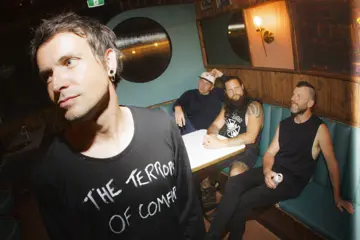When everything comes together and you find yourself dancing in a crowd of like-minded thousands while one of your favourite acts tears up the stage, maybe with a bit of pyro for flavour, the feeling is ineffable. Just the scale of it can make the experience profound, like you've been absorbed into a vast, fleeting collective consciousness. There's nothing else quite like it.
But what does it take to make that moment happen? Where would you even start?
If you have these kinds of questions, Jessica Ducrou, Peter Noble and Brian Taranto are the people to ask. As the co-CEO of Secret Sounds, Ducrou is behind some of Australia’s largest events, including Splendour In The Grass, Spin Off Adelaide, Falls Festival and Download. Noble has helmed Bluesfest for decades, the event becoming a calendar staple since its 1990 inception. As well as founding and running Love Police Records, Taranto organises hip, Tallarook camper Boogie Fest and one-day Americana party Out On The Weekend, two very different but equally well-curated boutique festivals.
So, where do we start?
Booking
"Other times we are paying well beyond their worth because our options are limited."
Whatever else an event offers, at the end of the day the biggest drawcard is the line-up. The bands are the ticket, particularly if you’ve got headliners like Childish Gambino or Iggy Pop, and putting together a solid bill takes time – at least a full year.
Ducrou says that as Splendour has grown booking has gone from a six-month process to where they are “now booking year-round, sometimes even scheduling artists for the following year’s event”, something echoed by Noble.
Don't miss a beat with our FREE daily newsletter
When we reach Noble he’s actually in New York “booking talent”. As a possible hint for future line-ups, he calls Brandi Carlile’s Madison Square Garden performance "one of the best shows I’ve ever seen ever, in my life!"
“It takes me over a year to book Bluesfest,” he tells The Music. “I’m booking [2021] now. Even a little bit of '22, I still haven’t finished 2020. If you wanna get the right lot of headliners, and for Bluesfest it is a five-day festival, with two headliner stages, pumping out headliners every day [you have to do that]."
Both Boogie and Out On The Weekend are smaller scale festivals than SITG, Falls or Bluesfest, catering to more specific demographics, but Taranto still calls booking a “365 days a year” job, although it seems like a labour of love.
"Both festivals are a bit of a selfish indulgence," says Taranto, "crossed with some commercial reality to make sure someone buys tickets. I'm a music fan, I'm a lifestyle festival fan, and I think there are enough people with similar tastes to me that will hopefully buy into the experience to make it all work."
That’s still not to imply that the process is a picnic. “International competition is fierce," says Ducrou, "particularly as the US festival market has developed over the last decade. Confirming our headliners is always so varied, sometimes agents are very clear they want [to] play our festivals, other times we are paying well beyond their worth because our options are limited."
 Splendour In The Grass 2018. Pic by Markus Ravik.
Splendour In The Grass 2018. Pic by Markus Ravik.
Location
"I think having a site is a neverending investment, but it’s still a great one. Because that’s guaranteeing your future."
When sourcing locations for festivals, ”They need to be spaces that suit the vibe you are trying to create," says Taranto, "at least initially.”
“Once a festival gathers its own momentum, the people pretty much show you how they want the space to work, so long as you pay attention.”
Noble’s advice is if you get the chance, lock it down. After taking "about three years to get all the approvals through", Noble purchased Tyagarah Tea Tree Farm, Bluesfest’s longstanding home, in 2007.
“It’s turned out to be the best thing we ever did. And we have just spent ten million dollars redeveloping the site.
“We had to forgo profit to do so. But it was a ten-year goal to get the site to a certain point, which that site is at now. It still doesn’t mean it doesn’t need money spent on it every year, but we have built a dedicated event site and those are rare on the ground in Australia.
“I think having a site is a neverending investment, but it’s still a great one. Because that’s guaranteeing your future.”
This year SITG and Falls also secured a permanent NSW home at North Byron Parklands, a process that took close to nine years to be approved by the state’s planning system. The site is also undergoing a $42 million development to grow the capacity to 50,000 punters per day.
"In the very first instance you need enough space to present the event," advises Ducrou. "Then you need to consider your surrounding neighbours.
“How many people will you potentially inconvenience. How will your audience access the venue? Is there a public transport system nearby? If not, can you provide a carpark and bus system? What is the capacity of the local road network? How supportive are your local stakeholders like the council and the police and what is required to secure approval?"
Marketing
"Be a good festival and deliver what you say you are going to do."
Getting the word out is key, and cutting through the chatter when there is so much competition can be difficult. Even events with 20 or nearly 30 years’ history need to be smart about where and how they spend their marketing budget.
"It changes all the time," says Ducrou. "Certainly right now a combination of digital and traditional marketing is critical to an event’s success. A good publicist is key and always keeping abreast of the various technologies on how best to find your audience. We never rest on our laurels or previous success, we don’t take our history for granted."
Taranto says the best thing you can do to promote yourself and your event is to keep your promises. "Be a good festival and deliver what you say you are going to do," he says. "Then grow and work your mailing list and socials and spend your limited marketing budget wisely. After a number of years, word of mouth is strong but people are so busy they still need to be reminded."
It also doesn’t hurt to have a hook. The most important thing, according to Noble, "is to be able to book the headline".
"You’ve got to be able to book them every single year and announce them far enough out that people will start to make plans to come to your event, versus somebody else’s. So what we announced a month ago, Dave Matthews Band and Patti [Smith] and people like that, literally eight months out from our event – we’re announcing the talent so that people make the decision which event they are going to come to over the summer. And we’re in the mix. We’re the last event of the season but we’re one of the first events to announce.
"And it just has to be like that, if you want to be successful you’ve gotta be able to be in front, and as much as marketing is important, socials marketing is now getting 90% of marketing."
 Justin Townes Earle performing at Out On The Weekend in 2014. Pic by Kane Hibberd.
Justin Townes Earle performing at Out On The Weekend in 2014. Pic by Kane Hibberd.
Funding
"It's an expensive and high risk proposition with small margins."
To highlight the possible cost (and risks), in 2013 Soundwave founder and promoter AJ Maddah responded to a tweet asking about that year’s expenditure with: “Off the top of my head artist budget was $26M, production was around $7M, sites around $10M, travel $4.6M.”
Two years later the touring event would fold, the company reported to have owed around 186 creditors something in the region of $26 million.
From performers down to waste disposal, festival outlay seems endless, and as Ducrou says, “To host an event, you need to be able to cover any potential loss.
“It’s an expensive and high risk proposition with small margins, I'm not sure many other industries would see the value, sometimes I don’t,” she says.
So where do you find funding for events on that scale? Is it a reasonable expectation to be able to cover some of that set-up with sponsors or grants?
“It’s a tough way to make a living,” says Decrou. “As a commercial business we have never received financial support from government stakeholders but it would make a huge difference if it were offered. Commercial rights or sponsorship often make the difference between losing money or covering costs.”
Boogie has never been supplemented, says Taranto, instead being funded by himself and three friends.
“We have had some minimal sponsorship for Out On The Weekend in the first two years, just because we could and it was easy enough to obtain. Hobson's Bay Council has given us a small grant each year for Out On The Weekend. If the process for any of it was difficult or involved us doing things we didn't want to do, we wouldn't do it.”
Noble however adds that for independent promoters, sponsors can be hard to come by.
“The landscape has changed,” says Noble. “There might have been more sponsors around four or five years ago. Nowadays, the monolithic companies, the AEGs and the Live Nations, they’re able to do world sponsorship deals. Then there might be, you know, the major phone companies or banks or whoever it may be, airlines, and then they’re able to filter that down through their network of events."
 Bluesfest 2019
Bluesfest 2019
Legalities
"Putting on a festival is not necessarily something that is for the faint-hearted."
Festivals have a lot of moving parts and each state has its own legislation around each of them.
The Victorian code of practice for running safer music festivals details at least 21 different bodies and authorities that should be contacted in preparation for a festival, from the local government authority to cleaning companies. The larger the event, the more people to contact, applications to lodge, and lead time required.
Falls attracts thousands across four states, SITG’s capacity is growing to 50,000, and Bluesfest sees turnouts up to and over 100,000 people. Without proper planning and duty of care, things could catastrophically. It sounds like a minefield to navigate.
“Where do you start!?” asks Ducrou. “Firstly, patron and staff safety is our foremost concern while trying to present a compelling and relevant event. Each state has its own approval process, each venue has its individual challenges you must respond to. With every decision we make we are mindful of our obligations and put rigour and process around how we operate. We learn from every show and always do our best to improve our performance. It's exhausting but very satisfying when you get it right.
The list of legislative requirements “as long as your arm and more”, says Noble.
“We have to comply with everything; comply with the police, with the council, the requirements, traffic management, all those things to put on an event. You have to comply with giving the Responsible Service of Alcohol. We need to have a field hospital, which we’ve had for ten years, so that if there’s an emergency we can deal with it. There’s so much to do and it’s not cheap. And so, the biggest challenge for new events is just how to do all that.
"Putting on a festival is not necessarily something that is for the faint-hearted."
 Splendour In The Grass 2018. Pic by Markus Ravik.
Splendour In The Grass 2018. Pic by Markus Ravik.





